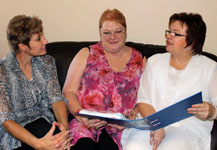Latest News Archive
Please select Category, Year, and then Month to display items
12 October 2020
|
Story Dr Cindé Greyling
|
Photo Supplied
 Exercise and nutrition can work wonders for your mental health – you don’t even have to ‘feel like’ or ‘enjoy’ moving around and eating well for it to work – it does its thing anyway.
Exercise and nutrition can work wonders for your mental health – you don’t even have to ‘feel like’ or ‘enjoy’ moving around and eating well for it to work – it does its thing anyway.
Nowadays, people talk about mental health like it is the common cold – which is good! But do you know what it really means? Being mentally healthy does not only refer to the absence of a mental illness but includes your emotional and social well-being. One would almost want to add physical well-being too, since a healthy body does indeed support a healthy mind. However, since so many people consider themselves ‘mental health experts’, some myths have been sold as truths.
Myth #1 – You are doomed.
Nope. Never. You are never doomed. There is always help. Mental-health therapies range from self-help, talk therapy, medication, to hospitalisation in some cases. Somewhere on this spectrum of treatments, there will be something that works for you. But you must be willing to get the help and do the work. For starters, exercise and nutrition can work wonders – you do not even have to ‘feel like’ or ‘enjoy’ moving around and eating well for it to work – it does its thing anyway.
Myth #2 – It won’t affect you.
It may. Research suggests that one in five people may suffer from a mental illness at some point in their lives. Being well now does not mean that it will stay that way. Biological and environmental factors both impact your mental health. Hopefully not, but at some point, you may experience an event that affects your mental health.
To remain integrated in a community is always beneficial
for anyone suffering from a mental or physical condition.
Myth #3 – Someone struggling with mental health must be left alone.
Hardly! To remain integrated in a community is always beneficial for anyone suffering from a mental or physical condition. You do not need to fix them, but to remain a friend. Continue to invite them, even if they decline. Do not judge, and do not try to understand. Just stay around.
Go and be kind to yourself, and to those around you.
UFS Faculty of Law and Department of Health join hands to combat modern day slavery
2012-10-03
 |
At this event, were from the left: Dr Adri Krieger and Dr Mariaan Kotze. Both are from the Department of Health: Directorate Forensic Services. Far right is Dr Beatri Kruger from the Unit for Children's Rights and the Department of Criminal and Medical Law at the UFS.
4 October 2012 |
Research and court cases confirm that the trade in people is a reality in South Africa. According to Dr Beatri Kruger from the Unit for Children's Rights and the Department of Criminal and Medical Law at the University of the Free State (UFS), complex challenges are faced in combating human trafficking. One of these challenges is a lack of knowledge of this crime and the difficulty in identifying trafficked victims.
To address the lack of knowledge, a number of discussions took place between Dr Kruger and delegates from the Department of Health.
A project has been initiated to address this problem in the public health sector. A need to raise awareness and provide training to medical practitioners to better understand human trafficking was identified. The most important aim of this initiative is to empower medical staff, to identify trafficked victims that visit hospitals and clinics countrywide and to also treat them appropriately in light of the severe trauma they have often been exposed to. The initiative will also empower medical practitioners to refer patients to other service providers such as social workers and psychologists.
The talks with medical practitioners from the Department of Health have led to training and awareness raising that will be provided at some of the local hospitals before the end of the year. Further training seminars are planned for medical practitioners, which will include a presentation by Dr Kruger on legal issues that are relevant for staff in the public health sector. The multidisciplinary cooperation that was established between representatives from the UFS Faculty of Law and the Department of Health has contributed substantially to a more effective response to human trafficking in South Africa.